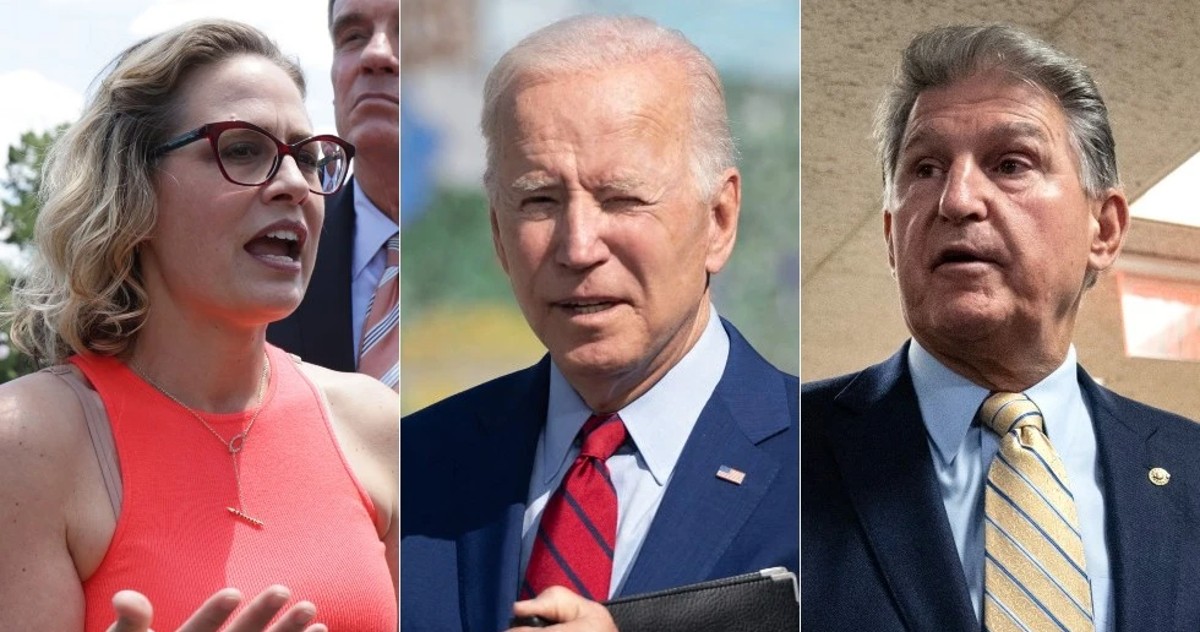OPINION: This article may contain commentary which reflects the author's opinion.
President Joe Biden, whose agenda has been largely sidelined by two Democratic senators, is likely to begin relying more on executive actions in order to get around them.
Sens. Joe Manchin of West Virginia and Kyrsten Sinema of Arizona have essentially derailed major White House agenda items because of their vehement opposition to overturning the current filibuster rule so that the bare Democratic majority can pass them with just 50 votes and Vice President Kamala Harris as the tiebreaker. Under the rule, it takes 60 votes to move most legislation.
Those agenda items include, per Just the News:
— Build Back Better: “Biden’s signature social spending package, which originally came in at $3.5 trillion, was scaled back to $2 trillion in a bid to gain the support of moderates following discussions involving the White House, Manchin, Sinema and congressional leaders. The legislation contained new federal benefits, climate-related spending, and tax credits for the purchase of electric vehicles. Sinema didn’t publicly commit to voting for the legislation, while Manchin announced in December 2021 that he would oppose the spending package, citing record inflation.”
— Federalizing election laws: “The Democrats turned to sweeping federal overhaul of election rules as their next major legislative target. Two pieces of legislation were on the table: the Freedom to Vote Act and the John Lewis Voting Rights Advancement Act. Senate Republicans opposed nationalizing election rules, arguing that under the Constitution’s Elections Clause state legislatures have primary responsibility for setting election rules, subject to ultimate congressional authority to override,” the outlet noted. “The only way the Democrats could move the bills forward in the 50-50 Senate was to scrap the time-honored Senate filibuster — with its 60-vote threshold required to pass legislation — in favor of a simple majority-vote rule. Both Manchin and Sinema spoke out against discarding the filibuster, arguing that such a move would muzzle the minority party in the Senate. Following the pair’s votes against abandoning the filibuster in January, Arizona Democrats censured Sinema.”
— Codification of abortion rights: Following the unprecedented leak last week of a draft Supreme Court majority ruling that overturned Roe v. Wade, the 1973 landmark precedent legalizing abortion in all 50 states, Democrats began moving ahead with legislation to codify the right of women to have the procedure into federal law. “Titled the Women’s Health Protection Act, the legislation was subject to the filibuster rule. As Manchin and Sinema remain opposed to eliminating the filibuster, Senate Democrats lacked the votes to pass the measure. In a Senate vote on Wednesday, Manchin voted against the bill while Sinema voted for it. Manchin also opposed a separate abortion rights bill in February,” Just the News added.
Now, as inflation rages, gas and diesel prices skyrocket, the supply chain crisis continues, and the U.S.-Mexico border remains chaotic — and with the Biden agenda stalled six months out from the midterm elections — the White House is looking to solve the ‘problem’ of Manchin and Sinema with a series of executive orders that includes canceling some student debt, implementing new immigration reforms, and adding some police reforms as well.
However, as Just the News explains, “executive orders are inherently unstable fallback options — vulnerable both to constitutional challenge on separation of powers grounds and executive revocation by a White House successor.”
Last week, outgoing White House Press Secretary Jen Psaki said: “There are a range of executive actions we’re currently looking at — right? We’re looking at one on police reform. The president is certainly looking at steps he can take on student debt, and there are others we’re looking at as well.
“But at the same time, we’re also looking to get the Bipartisan Innovation Act through. We’re looking to see what can be done on a range of issues where we feel there is bipartisan support. And we’re continuing to engage closely with Democrats in Congress about a reconciliation package to lower costs for the American people,” she added.
The details of that reconciliation spending package are still not settled, so it’s not clear if it would garner support from Manchin and Sinema, Just the News noted.
